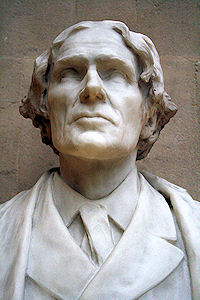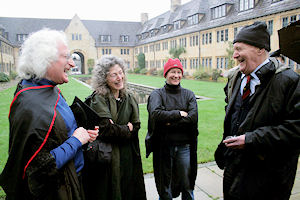VERO IN THE MEDIA
VERO’s core subject has been the ethics of science at Oxford University, and most of its media appearances and output have therefore been in the University or town media, whose principal journals are as follows: the Oxford Magazine is the University’s only independent journal for essays, reviews, letters, and other writings of interest to the University’s present and former members; the Cherwell and Oxford Student are the University’s two student newspapers; the Oxford Mail and Oxford Times are Oxfordshire’s principal daily and weekly newspapers.
Oscar Horta, C. S. Lewis, and the Fall of Nature
Matthew Simpson
Oxford Magazine, No.363, Michaelmas Term 2015
Should humans do something to relieve the suffering which wild animals endure in the ordinary (and ruthless) course of nature? The philosopher Oscar Horta believes so, and recently presented his case to an Oxford audience. The great Oxford alumnus and don C. S. Lewis thought so too (remarkably for his time), and this article shows how this and other aspects of our relations with our fellow-animals (including the vivisection which so much angered him) were brilliantly dramatized in his fiction for adults and for children.
Schweitzer at Mansfield
Matthew Simpson
Oxford Magazine, No.351, Michaelmas Term 2014
It was at Mansfield College in Oxford that Albert Schweitzer introduced the ideas on ethics which were soon to become famous under the name ‘reverence for life’. He is much-quoted in animal rights circles; in fact the title of Jon Wynne-Tyson’s great anthology of quotations, The Extended Circle, is derived from a statement of Schweitzer’s. But elsewhere he seems to have fallen out of fashion. This article shows why he needs to be remembered and learned from, now more than ever before.
Oxford Times, 21 August 2014
Letter to the Editor: 'Uglier Truths'
This letter responds to an 'opinion' piece by Richard Scrase of Understanding Animal Research. What that piece was doing in the Oxford Times is not clear: it had no local reference, and was simply UAR promotion with a personal gloss to it. However, it illustrated very well what UAR and the organisations it represents always did mean by their 2012 'Declaration on Openness' (see 'Being Open about Animal Research' below): not better information, better public access, or more candour, just an increase in propaganda.
Daily Mail, 6 May 2014
An open letter to the Minister of Defence
A group of vets, led by VERO’s André Menache, protest against the cruel and unnecessary use of live animals in the training of UK military surgeons - an especially ugly variety of vivisection. The subject is given full coverage in this Daily Mail report.
www.dailymail.co.uk/news/article
The Times, 16 April 2014
Animals that live and die for science
In a letter to the Times newspaper to mark the forthcoming World
Day for Animals in Laboratories, some members, patrons, and friends of VERO,
including professors Peter Singer and Michael Balls, invite Oxford
University to redeem its promise of “openness” by explaining why, contrary
to the aims and expectations of UK law on the subject, its use of animals in
research continues to increase.
Oxford Magazine, No. 340, Michaelmas Term 2013
Ruth Harrison and Other Animals
Matthew Simpson
Ruth Harrison is best known for Animal Machines (1964), her pioneering exposé of factory farming. However, she knew that something more than particular reforms was needed: hence her contribution to the revolutionary book Animals, Men and Morals (1971). Another of its contributors was Dr Richard Ryder, whose coinage ‘speciesism’ brilliantly summarised what was (and is) wrong with the human view of other animals. Ryder’s particular theme was animal research, but – as Ruth Harrison observed – that sort of research underlies all technological exploitation of animals. In fact this article reveals that animal researchers – at least in her time – had in mind an even more thorough subjugation of animals than the one she was warning us about.
![]() ruthharrisonandotheranimals.pdf
ruthharrisonandotheranimals.pdf
Oxford Magazine, No.333, Hilary Term 2013
Being Open about Animal Research: the University makes a Declaration
Matthew Simpson
Oxford University has joined other UK institutions which use or promote animal research in a “Declaration on Openness on Animal Research”. Is this anything more than a PR stunt? The author invites the University to show its good faith by telling the Magazine’s readers how it intends to proceed (but the University preferred not to reply).
Oxford Magazine, No. 291, Michaelmas Term 2009
Open Letter to the Vice- Chancellor
A group of 14 distinguished Oxford alumni and VERO patrons, including J. M. Coetzee, Desmond Morris, Jonathan Porritt, and Ann Widdecombe, write to the incoming Vice-Chancellor, Professor Patrick Hamilton, urging his new administration to make the University a leader in non-animal medical research, and to be more open about what is really happening now in its laboratories.
![]() Openlettertovicechancellor.pdf
Openlettertovicechancellor.pdf
Oxford Magazine, No.289, Trinity Term 2009
Coetzee in Oxford
Matthew Simpson
A rare visit to Oxford by the novelist J.M.Coetzee, patron of VERO and holder of an honorary doctorate from the University, provides an occasion to recall his fictional alter-ego Elizabeth Costello, who first appears in The Lives of Animals (1999). She is a novelist and (like Coetzee) an Australian resident. When she visits Appleton College in the U.S.A., she is tactless enough to make her hosts painfully conscious of their (and her own) complicity in animal suffering. Coetzee will no doubt be more polite in Oxford, but there’s no doubt that he shares Ms Costello’s opinions.
Cherwell, Thurs 20 November
Tony Benn joins animal lab protest
On the occasion of the opening of the new laboratory, VERO patron Tony Benn visits Oxford on a cold and wet day to join VERO members in a formal statement of opposition.
Oxford Student, Thurs 20 November
Tony Benn joins fight against Oxford’s lab
Oxford Mail, Mon 17 November
Tony Benn joins lab protest
www.oxfordmail.co.uk/search/3855578.Campaigner_Benn_joins_lab_protest
Oxford Magazine, No.276, Trinity Term 2008
“a duty from which I cannot deviate”: Bodley’s Librarian and the New Laboratory
Matthew Simpson
This is the story of Edward Nicholson and the extraordinary and heroic campaign which he led against Oxford University’s first physiology laboratory in the 1880s, with the support of some of Oxford’s leading personalities, including its professor of Fine Art, John Ruskin.
Oxford Magazine, No.272, Hilary Term, 2008
The Future of Food
Paul Freestone
This is a survey of the consequences to the world environment of the modern Western diet, focused on meat and dairy, which is now the model for developing nations. Water and land are being squandered and poisoned, natural life trashed, and climate change accelerated, by a diet that does its consumers equivalent harm. The article is based on a talk given at a VERO seminar.
 Oxford Magazine, No.262, Hilary Term, 2007
Oxford Magazine, No.262, Hilary Term, 2007
A Physiologist comes to Oxford
Matthew Simpson
Oxford University’s first Waynflete Professor of Physiology, John Scott Burdon Sanderson, was appointed in 1882. A new laboratory was to be built for him, and this, together with his unattractive reputation as “the high priest of vivisection”, prompted angry opposition within the University. This article gives a portrait of the man, and an account of his reception at Oxford.
Parish Magazine of St Giles’ and St Margaret’s, Oxford, March 2007
Christians and Animal Rights
Martin Henig
Too often, Christian thought has kept the animals outside the scope of the obligations taught by Christ. This article puts the Christian case for animal rights, reminding Christians that something more than polite sympathy is asked of them: “Jesus overturned the tables of the moneychangers in the Temple rather than sending in a letter of complaint to the Chief Scribe.”
The Guardian, 18 February 2007
Experimental Theatre
Marius Maxwell
A neurosurgeon and VERO associate tells Guardian readers why he deplores Oxford University’s decision to build a new animal research laboratory. Monkeys are inherently bad models for human diseases, and their fear and suffering distorts even what little might be learned from them: in short, “experimenting on sick, terrified animals endangers human lives.” The future of medical research lies in the new high-tech developments, which Oxford ought to be leading instead.
Oxford Magazine, No.259, Hilary Term 2007
Ethics and the Weatherall Report
Katherine Morris
The Weatherall Report concluded that research using non-human primates was not just scientifically valid but even “morally required”. Here, an Oxford philosopher examines the ethical thinking behind that phrase, and finds it partial and confused.
Press release, 24 December 2006
Oxford Vivisectionists are Swimming against the Tide
Marius Maxwell
The confidence shown by the Weatherall Committee in research using non-human primates is not based on good scientific evidence, the neurosurgeon Marius Maxwell argues. He believes, besides, that the recent strident promotion of their own work by some Oxford scientists is not only unsound but unprofessional and embarrassing to others in medical science.
Church Times, 8 September 2006
The Sacrifice of Animals to save Human Lives
Martin Henig
In a letter to the Church of England’s principal newspaper, Dr Henig urges it to take the interests and sufferings of animals more seriously; it’s not just for “ourselves and our fellow man” that we should pray and act, but for “the world in its complexity”.
Oxford Magazine, No.254, Trinity Term 2006
I Protest against Bad Arguments – Do you?
by ‘An Oxford Philosophy Tutor’
In the early days of the Oxford group called Pro-Test, which campaigned in support of unimpeded animal research in the University, its points of view were promoted in an article titled ‘I am Pro-Test: are You?’ In the present article, an Oxford philosopher shows how much bad logic and mere bumptiousness there was in that piece, from its absurd self-identification with the Spartacus rebellion onwards.
Press Release, 3 July 2006
New group of Oxford academics calls University to account over animal lab
A press release and open letter to the University’s Vice-Chancellor introduces VERO and its aims: to persuade the University to re-direct its talents and funds to non-animal research techniques, with meanwhile more candour about what is presently being done with animals in its laboratories.
The Guardian, 10 March 2006
We’re not Terrorists, and we’re not against Progress
Sharon Howe
This article refutes the common caricature of vivisection’s opponents as anti-science irrationalists. The caricature may be useful for propaganda or newspaper headlines, but it contributes nothing to the intelligent and informed debate from which anti-vivisectionists believe they have everything to gain.
www.guardian.co.uk/science/story/0,,1727750,00.html

The Independent, 6 March 2006
Animal Testing is both Cruel and Unnecessary
Sharon Howe
One of the founders of VERO explains why she felt obliged to return her first-class Oxford degree to the University when it decided to build a new animal-research laboratory.

